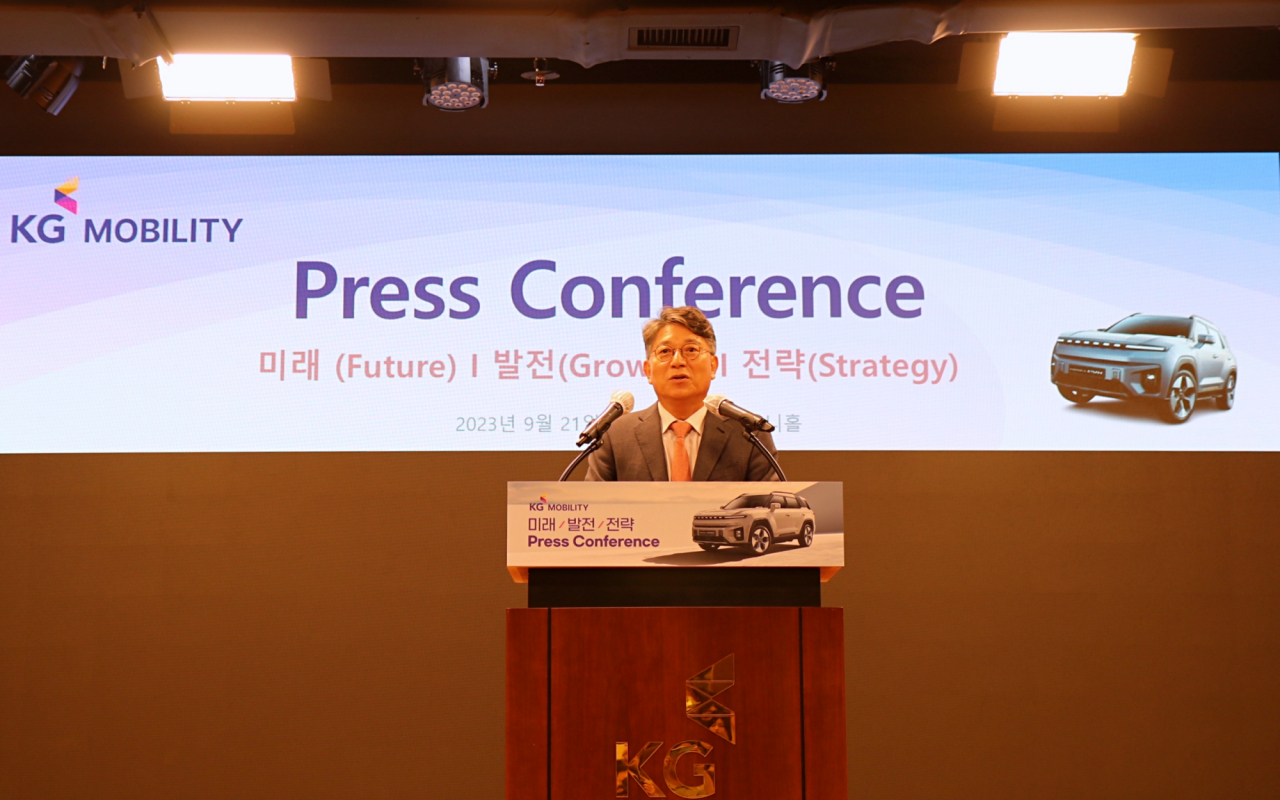 |
KG Mobility Chairman Gwak Jae-sun speaks during a press conference at KG Tower in Jung-gu, Seoul on Thursday. (KG Mobility) |
KG Mobility on Thursday vowed to sell 200,000 cars in global markets by 2026, expanding its global networks from the Asia-Pacific region to Europe.
The South Korean carmaker’s planned sales target consists of 200,000 exports -- 100,000 cars and 100,000 units of complete knock-downs -- unassembled car parts -- and 120,000 units of domestic sales in the citied period.
“Based on the cumulative $1 billion exports, we are expected to be awarded as one of the Korean companies to have contributed to have boosted trade (from the government) in November,” said KGM Chairman Gwak Jae-sun during a press conference in Seoul. “Our goal is to expand exports by twofold in two years.”
Gwak added that the Torres EVX, an electrified version of KGM's bestselling midsized sport utility vehicle, will be launched next year in Europe, a booming market for compact cars and the world’s second-largest country for electric vehicles.
By country, the company’s sales subsidiary in Germany will start operations around autumn next year and make its foray into Europe. Saudi Arabia’s governmental project to boost the production capacity of the nation's automotive industry will be a key channel to ramp up KGM's business Middle East and Africa. The carmaker also plans to expand its footing in Mexico, Chile, Kazakhstan, Vietnam and Australia.
“Southeast Asia, in particular, is witnessing a severe air pollution problem largely caused by incombustible engine vehicles and making efforts to accelerate transportation electrification,” Gwak said. “We are working on rolling out electrified buses in Vietnam produced by Edison Motors (which is expected to be acquired by KGM).”
Making a commitment to add full EV lineups and commercial vehicles to its SUV-focused business portfolio, KGM is scheduled to launch a new coupe model in June next year. The first Korea-made electric pickup, O100, and high-performance hybrid cars will make their market debuts in 2024 and 2025, respectively. From 2026, EV lineups will be installed with the company’s exclusive EV platform.
For EV battery technologies, the carmaker said it plans to develop cell-to-body technology, a battery cell integration which improves space utilization and vehicle safety and performance, next generation thermal management and battery management system based on big data by next year.
When asked about possible business partnerships with Korean battery makers in passenger cars, Gwak noted that although the Torres EVX is equipped with Chinese firm BYD’s lithium iron phosphate batteries for price competitiveness, other car models may use Korea-made batteries.
Commercial buses produced by Edison Motors, whose name will be changed to KG M Commercial, mostly use LG Energy Solution’s batteries, according to the company. From next month, they will also install cylindrical batteries made by Samsung SDI for enhanced performance.
As for future mobility business, it will further develop its advanced driver assistance systems for autonomous driving and launch a robotaxi service with level four self-driving technology next year. In a move to advance software defined vehicles technology, it looks to provide over-the-air updates -- in which operating software can be updated remotely -- for new car lineups from 2024. In-app payment will be available in 2025.
Stressing that KGM, formerly known as debt-ridden SsangYong Motors, will never operate loss-making business, Gwak said, “from the third quarter of 2022 to the third quarter of this year, the company has been generating profit. We expect to witness this for the last business quarter and in yearly earnings as well.”







